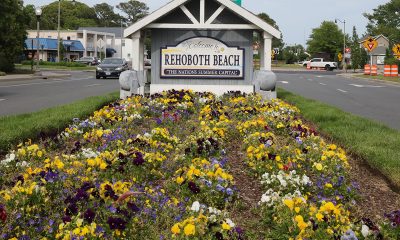World
Global Pride events in full swing
Activists plan to demand rights, protest inequalities
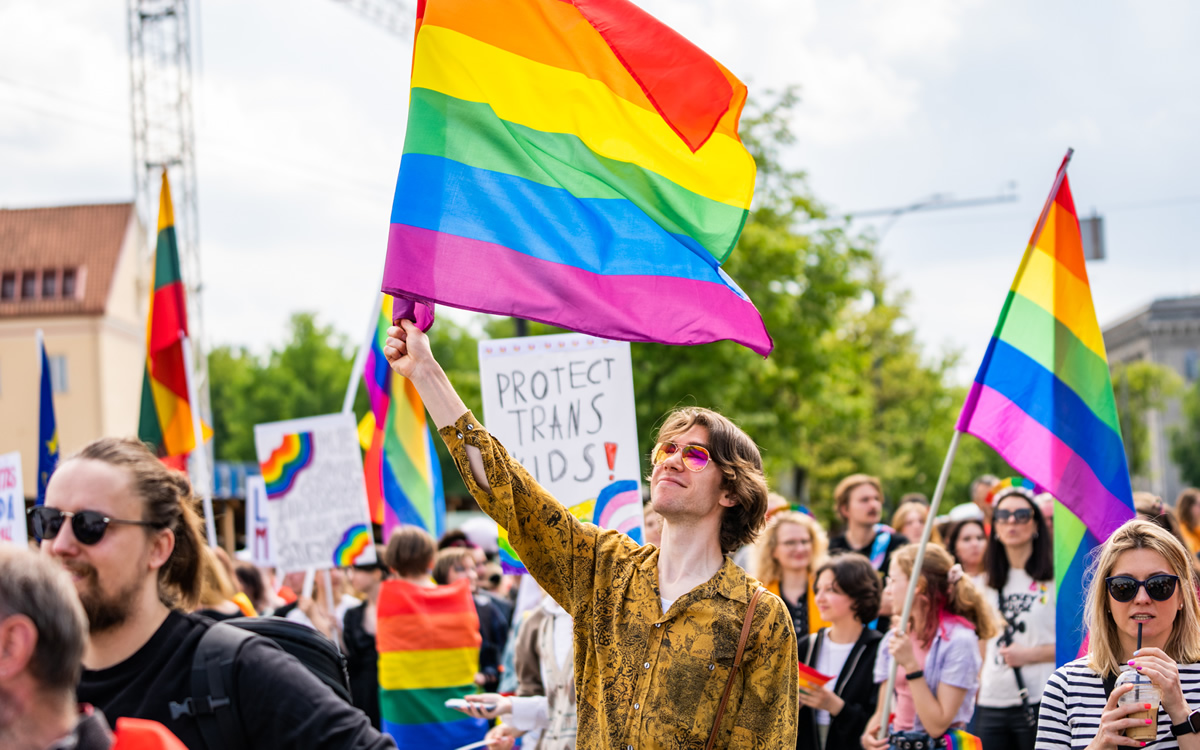
Pride events are in full swing around the world.
Thousands of people on June 5 attended Bangkok’s first official Pride parade in 16 years.
Openly gay Lithuanian MP Tomas Vytautas Raskevičius and U.S. Ambassador to Lithuania Bob Gilchrist are among those who participated in Baltic Pride 2022 that took place in Vilnius, the Lithuanian capital, on June 4. Jerusalem’s annual Pride parade occurred two days earlier against the backdrop of the arrest of a man in connection with death threats made against its organizers.
Canadian Prime Minister Justin Trudeau on June 1 helped raise the Progress Pride flag over his country’s Parliament. “This is a time to celebrate our differences and support one another and to make sure that ever day we are building a Canada where everyone is free to be who they are and love who they love,” he said in a video he posted to his Twitter page.
Today, we raised the Pride flag on Parliament Hill. The flag is a symbol of hope, solidarity, and diversity – and raising it is a symbol of our ongoing commitment to building a country where everyone can be who they are and love whom they love. Happy Pride season, everyone! 🏳️🌈 pic.twitter.com/lCjonmxw31
— Justin Trudeau (@JustinTrudeau) June 2, 2022
Olena Shevchenko, chair of Insight, a Ukrainian LGBTQ rights group, told the Washington Blade that she and other activists from her war-torn country plan to attend Warsaw Pride in Poland on June 25.
This year marks London Pride’s 50th anniversary.
The British government was to have hosted a global LGBTQ rights conference in London from June 29-July 1, but it cancelled it in April after advocacy groups announced a boycott in response to Prime Minister Boris Johnson’s decision to support a bill to ban so-called conversion therapy without gender identity. The London Pride parade is scheduled to take place on July 2.
The Cayman LGBTQ Foundation in the Cayman Islands will hold its annual Pride parade on July 30. The event will take place less than five months after the Privy Council’s Judicial Committee in London ruled same-sex couples in the British territory don’t have a constitutional right to marry.
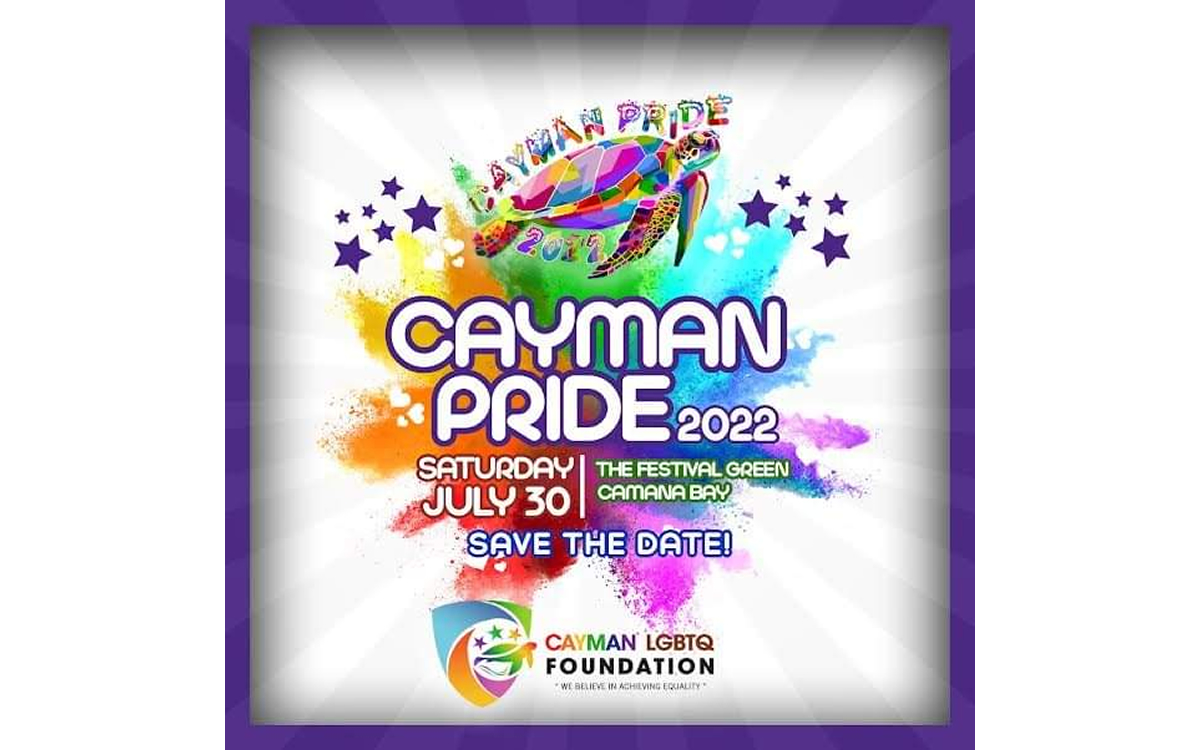
Jamaica is among the upwards of 70 countries in which consensual same-sex sexual relations remain criminalized. J-FLAG and other Jamaican LGBTQ rights groups will hold a series of Pride events during the first week of August, which coincides with the country’s Emancipation and Independence Days.
“It’s always been incident free,” J-FLAG Associate Director of Marketing and Communications and Engagement Elton Johnson told the Blade on Tuesday from Kingston, the Jamaican capital. “We get support from the police. We get support from many organizations, schools.”
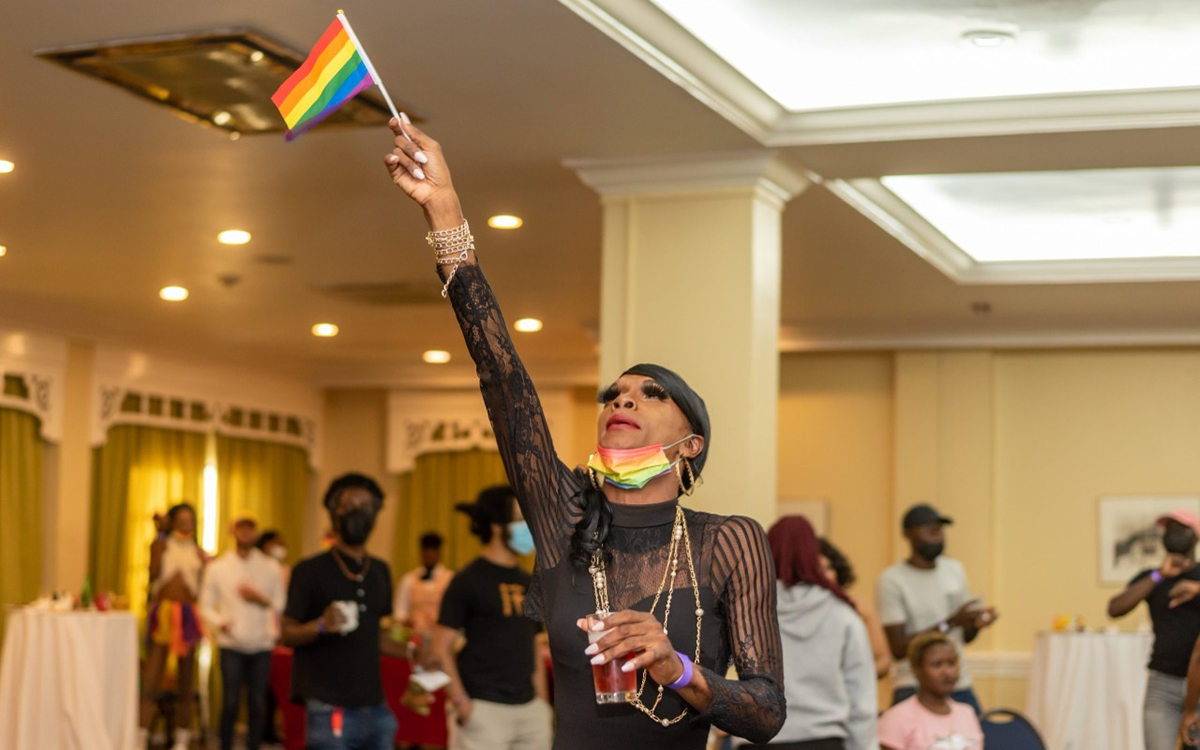
African LGBTQ groups to continue decriminalization push
LGBTQ activists in Africa are also planning to commemorate Pride.
The government of Botswana in January said it will abide by a ruling that decriminalized homosexuality in the country. A plethora of other African countries still outlaw same-sex relations and those found guilty of homosexuality in places where Sharia law exists face the death penalty. Advocacy groups on the continent plan to use Pride to further push for decriminalization.
“The 2SLGBTQIA+ community has made dramatic strides in recent decades that absolutely should be celebrated, [but] there is still much more work to do to ensure intersectional equality and justice for all but as we prepare to commemorate the 2SLGBTQIA+ Pride, let us be cognizant that the discrimination of 2SLGBTQIA+ persons in the country is still rife,” said the Rock of Hope, an LGBTQ rights group in Eswatini. “These events or awareness activities should bring meaning and strengthen the movement such that one day we can reside in a country free of hate, stigmatization and discrimination of individuals based on their sexual orientation and gender identity expression.”
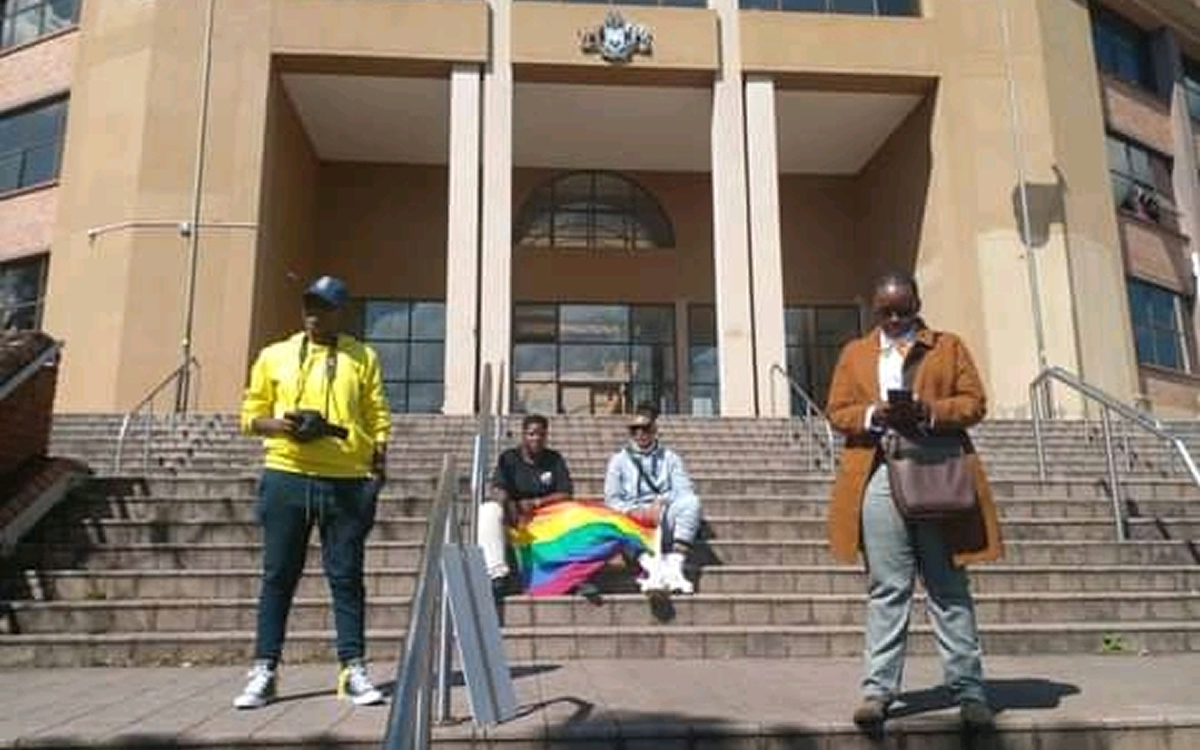
Beit el-Meem, an Egyptian LGBTQ rights group, echoed the Rock of Hope.
“The road is not easy, but not impossible, and what distinguishes us is that each individual of us excels with the power of love and acceptance, and with this energy we will give to everyone around us,” said Beit el-Meem.
LGBT+ Rights Ghana has been at the forefront of the campaign against a bill that would criminalize LGBTQ identity and allyship in the country.
The U.S. Embassy in Ghana on Tuesday tweeted a picture of President Biden speaking in support of LGBTQ rights. The tweet also said the U.S. “reaffirms that LGBTQI+ rights are human rights and that no group should be excluded from those protections, regardless of race, ethnicity, sex, gender identity, sexual orientation, sex characteristics, disability status, age, religion or belief.”
The U.S. reaffirms that LGBTQI+ rights are human rights and that no group should be excluded from those protections, regardless of race, ethnicity, sex, gender identity, sexual orientation, sex characteristics, disability status, age, religion or belief. #Pride2022 pic.twitter.com/UTdh9cFWYE
— U.S. Embassy Ghana (@USEmbassyGhana) June 7, 2022
LGBT+ Rights Ghana said it plans to mark Pride with its virtual Color Dialogue conversations it holds every year.
“This year promises to be fun, hopeful and filled with lots of love,” said the group. “Join us everyday at 6 p.m. GMT on our Instagram page as we discuss the struggles, hopes and joy of the Ghanaian Queer community.”
Brazil presidential election overshadows São Paulo Pride
São Paulo’s annual Pride parade, which is one of the largest in the world, will take place on June 19.
Brazilian activists will mark Pride against the backdrop of their country’s presidential election campaign. HIV/AIDS service providers and LGBTQ activists with whom the Washington Blade spoke while on assignment in Brazil in March said they are afraid of what may happen in their country is President Jair Bolsonaro wins a second term later this year.
“He represents a danger to the environment,” Mariah Rafaela Silva, a transgender woman of indigenous descent who works with the Washington-based International Institute on Race, Equality and Human Rights, told the Blade on March 21 during an interview at a Rio de Janeiro restaurant. “He represents a danger to diversity. He represents a danger to Black people. He represents a danger to indigenous people.”
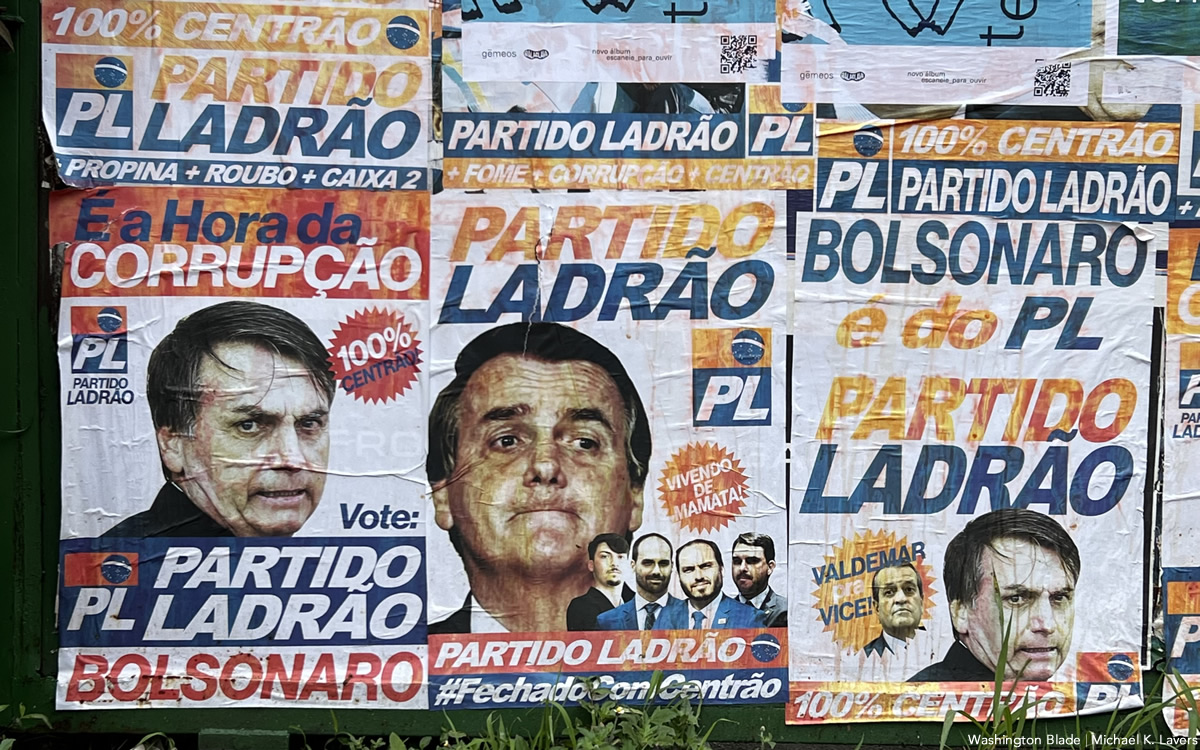
Activists in other South American countries plan to use Pride events to demand further rights.
Organizers of the annual Pride parade that will take place in Santiago, Chile, on June 25 plan to call for additional reforms to the country’s Penal Code and anti-discrimination law and demand an end of violence based on sexual orientation and gender identity. The event will take place less than a month after a trans woman, Yuridia Pizarro, was killed in Iquique, a city in northern Chile.
Pride parades are also scheduled to take place in the capitals of Peru, Ecuador and Bolivia respectively on June 25.
Somosgay, an LGBTQ rights group in Paraguay, is planning to hold a Pride march in Asunción, the country’s capital, on July 2. A Pride march dedicated to León Zuleta and Manuel Velandia, the founders of Colombia’s LGBTQ rights movement, will take place in Bogotá, the country’s capital, on the same day.
A Pride march is scheduled to take place in the Venezuelan capital of Caracas on July 3. Activists in Argentina and Uruguay will hold Pride marches later this year.
India
India’s first transgender healthcare clinic reopens
Mitr Clinic closed after losing USAID funding

A U.S. Agency for International Development funding freeze in January forced the closure of India’s Mitr Clinic, the country’s first transgender healthcare facility, disrupting critical services for a vulnerable population.
Six months later, the clinic has reopened as Sabrang Clinic, reviving access to essential care for the transgender community.
Major Indian corporations, including some of the nation’s largest multinationals, stepped up with substantial financial support. Their backing has enabled Sabrang Clinic to resume its mission of delivering specialized, stigma-free medical services.
The former Mitr Clinic on May 2 reopened as the Sabrang Clinic. YR Gaitonde Center for AIDS Research and Education, an HIV/AIDS service organization, manages the facility.
The Sabrang Clinic sparked controversy in the U.S. when U.S. Sen. John Kennedy (R-La.) in February denounced its USAID funding, arguing that American taxpayer dollars should not support trans healthcare initiatives abroad. President Donald Trump amplified the criticism, labeling the agency’s spending on such programs as “wasteful” and aligning with his administration’s broader push to curb federal support for gender-affirming care. White House press secretary Karoline Leavitt further fueled the debate, citing the clinic’s funding as part of a pattern of USAID’s “radical” expenditures, while House Speaker Mike Johnson (R-La.) echoed the sentiment, decrying similar international projects as misaligned with American priorities.
Elon Musk, who until May led the Department of Government Efficiency, added to the controversy surrounding the clinic.
“That’s what American tax dollars were funding,” he said in a Feb. 28 X post.
His remark, made before his departure from the Trump-Vance administration, spotlighted the clinic’s USAID support, intensifying debates over its role in delivering trans healthcare in India.
The Washington Blade on Feb. 27 detailed how the USAID funding freeze crippled Mitr Clinic’s operations, spotlighting the broader fallout for South Asian LGBTQ organizations.
The Blade noted the clinic, a vital resource for trans healthcare in India, faced abrupt closure alongside groups in Nepal, Bangladesh, and Pakistan, as the freeze slashed support for programs addressing HIV/AIDS, mental health, and gender-based violence, leaving thousands without access to essential services.
The U.S. President’s Emergency Plan for AIDS Relief (PEPFAR) and USAID in 2021 launched Program ACCELERATE, spearheaded by the Johns Hopkins University School of Medicine, to establish Mitr Clinic in Hyderabad in Telangana State. As India’s first comprehensive healthcare center for the trans community, the facility offered tailored medical services, including HIV/AIDS treatment and mental health support, filling a critical gap in the region’s healthcare landscape.
Sabrang Clinic serves a critical role for India’s estimated one million trans people, a population facing a disproportionate HIV/AIDS burden.
A 2019 Reuters report noted a 3.1 percent HIV prevalence among trans people, translating to roughly 31,000 individuals living with the virus, compared to the national adult rate of 0.26 percent. Similarly, a 2021 UNAIDS report cited a 3.8 percent prevalence, suggesting approximately 38,000 trans people with HIV/AIDS.
Internal reports indicate the clinic since it opened in 2021 has served more than 3,000 patients. It has become a model of community-led care that fosters trust and addresses the unique health needs of trans people in Hyderabad.
When USAID funding cuts forced Sabrang Clinic’s closure, scores of people and LGBTQ community members in Hyderabad were left without access to reliable, stigma-free healthcare. Undaunted, the clinic’s trans-led team pivoted to virtual consultations and medication delivery, sustaining critical support for patients until corporate funding revived operations.
Tata Trusts, a philanthropic arm of India’s Tata conglomerate, in April pledged to fund the clinic for three years.
The Hindu, a leading Indian English-language newspaper, reported the trust committed approximately $18 per person a year to sustain the clinic’s operations. This contrasts with the earlier USAID program, which had provided about $23 per person each year.
Tata Trusts covers the salaries of Sabrang Clinic’s core medical staff, while its leadership positions are jointly funded by Tata and the clinic’s parent organization. The clinic is now pursuing partnerships with additional donors to expand its trans-focused healthcare services.
“We are elated to continue this service, as we have always believed that sexual minorities deserve respect and their right to self-expression,” said YRGCARE Chief Operating Officer A.K. Srikrishnan. “That’s why we launched Mitr Clinic under Project ACCELERATE in 2021, and it operated until January 2025. The Trump administration’s USAID funding withdrawal forced a shutdown, but we have no comment on that. Fortunately, with great vigor, we secured support from Tata Trusts to sustain Sabrang Clinic. The name change to Sabrang, also called ‘Help for All,’ was simply to reposition the brand, with no deeper logic attached.”
Srikrishnan told the Blade that YRGCARE will aim to raise additional crowdfunding and support if the current funding proves insufficient to maintain the same level of services at the clinic. Srikrishnan also thanked Tata Trusts for its support.
“We want to expand it throughout the country given the choice,” said Srikrishnan. “If someone were to tell us, ‘Can you run it across the country?’ we would certainly love to do it.”
“Sexual minorities are a reality, and however much someone wishes them away, they exist and need to exist with the respect and rights they deserve,” added Srikrishnan. “We do not differentiate between local and foreign contributions; when we needed it most, Tata Trusts stepped in and helped. So we are certainly grateful to them.”
Spain
Spanish women detail abuses suffered in Franco-era institutions
Barcelona-based photographer Luca Gaetano Pira created ‘Las Descarriadas’ exhibit
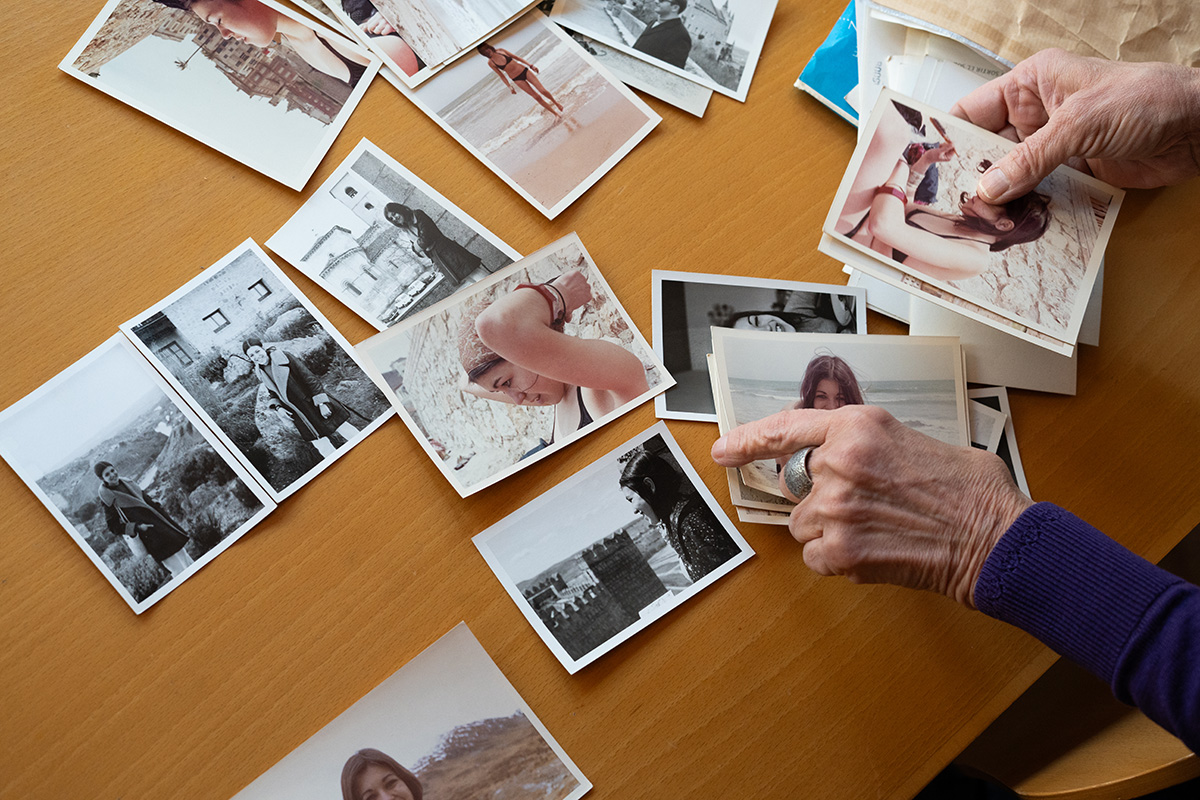
A Barcelona-based photographer, audiovisual artist, and activist has created an exhibit that profiles Spanish women who suffered abuse in institutions that Gen. Francisco Franco’s dictatorship established.
Luca Gaetano Pira, who is originally from Italy, spoke with women who the regime, which governed Spain from 1936-1975, sent to Women’s Protection Board institutions.
The regime in 1941 created the board the country’s Justice Ministry oversaw.
Franco named his wife, Carmen Polo, as the board’s honorary president. Then-Prime Minister Felipe González fully dissolved the board in 1985, a decade after Franco’s death.
Gaetano’s exhibit is called “Las Descarriadas” or “The Misguided Women” in English.
“These are women who were detained between 1941 and 1985 for reasons that are unthinkable today: being lesbian, poor, pregnant out of wedlock, rebellious, politically active … or simply considered ‘morally suspect,'” Gaetano noted to the Washington Blade.
Groups affiliated with the Spanish Catholic Church ran these institutions. Gaetano pointed out they were “presented as social assistance centers.”
“In reality, they were spaces of punishment and forced reeducation, where isolation, unpaid work, and psychological violence were the norm,” he said. “Many of the survivors are still alive. Their testimonies are powerful, urgent, and of extraordinary current relevance.”
The regime sent more than 40,000 women to Women’s Protection Board institutions.
“Despite its seemingly benevolent name, it was in fact one of the most powerful instruments of moral and social control over women during and after the dictatorship,” notes the exhibit. “Under the guise of care and re-education, this institution functioned as a repressive apparatus that punished women who deviated from the ideal feminine model imposed by Franco’s regime: submissive, obedient, married, and dedicated to motherhood within the Catholic family structure.”
The Spanish Catholic Church last month issued a public apology, but Gaetano described it as “very soft” and noted “the women did not accept it.” Gaetano also compared the Women’s Protection Board institutions to Ireland’s Magdalene Laundries.
The Associated Press notes tens of thousands of “fallen” women were sent to the laundries that Catholic nuns operated in Ireland from the 18th century until the mid-1990s. Then-Irish Prime Minister Edna Kenny in 2013 issued a formal apology for the abuses that women suffered in the laundries and announced the government would compensate them.
The Spanish government has yet to offer compensation to the women abused in Women’s Protection Board institutions.
“My work focuses on recovering the historical memory of marginalized communities, particularly through the portrayal of survivors of institutional violence and the use of archival materials,” Gaetano told the Blade, noting he has also sought to highlight the repression that LGBTQ people suffered during dictatorships in Portugal and Latin America.
Gaetano’s exhibit can be found here:
Afghanistan
ICC issues arrest warrants for Taliban leaders over persecution of LGBTQ people, women
Groups ‘non-conforming’ with group’s gender policy targeted

The International Criminal Court on Tuesday issued arrest warrants for two top Taliban officials accused of targeting LGBTQ people, women, and others who defy the group’s strict gender norms.
The warrants are for Hibatullah Akhundzada, the Taliban’s supreme leader, and Afghanistan Chief Justice Abdul Hakim Haqqani.
“Based on evidence presented by the Office (of the Prosecutor), the judges found that there are reasonable grounds to believe that they have committed — by ordering, inducing, or soliciting — the crime against humanity of persecution, under article 7(1)(h) of the Rome Statute, on gender grounds, against girls, women, and other persons non-conforming with the Taliban’s policy on gender, gender identity or expression; and on political grounds against persons perceived as ‘allies of girls and women,’” reads an ICC press release that announced the warrants.
Karim Khan, the ICC’s chief prosecutor, in January announced a request for warrants against Taliban officials over their treatment of women and other groups since they regained control of Afghanistan in 2021. The request marked the first time the court specifically named LGBTQ people as victims in a gender persecution case before it.
“The issuance of the first arrest warrants in the situation in Afghanistan is an important vindication and acknowledgement of the rights of Afghan women and girls,” reads the press release the ICC released on Tuesday. “It also recognizes the rights and lived experiences of persons whom the Taliban perceived as not conforming with their ideological expectations of gender identity or expression, such as members of the LGBTQI+ community, and persons whom the Taliban perceived as allies of girls and women.”
A report that Outright International released in 2023 notes Taliban officials have systematically targeted LGBTQ people — especially gay men and transgender women.
Taliban officials have subjected them to physical and sexual assault as well as arbitrary detention. The Outright International report also notes Taliban authorities have carried out public floggings for alleged same-sex sexual relations, and have collected intelligence on LGBTQ activists and community members.
Artemis Akbary, executive director of the Afghanistan LGBTIQ Organization, praised the ICC.
“Today is a historic moment for LGBTIQ victims and survivors,” he said on social media.
-

 Federal Government2 days ago
Federal Government2 days agoTreasury Department has a gay secretary but LGBTQ staff are under siege
-

 Virginia3 days ago
Virginia3 days agoDefying trends, new LGBTQ center opens in rural Winchester, Va.
-

 District of Columbia2 days ago
District of Columbia2 days agoGay GOP group hosts Ernst, 3 House members — all of whom oppose Equality Act
-

 District of Columbia2 days ago
District of Columbia2 days agoD.C. police seek public’s help in July 5 murder of trans woman

